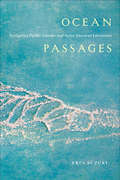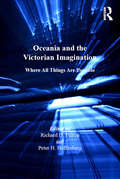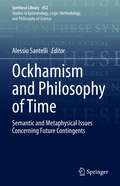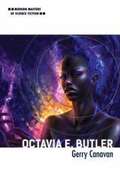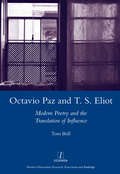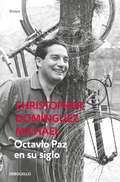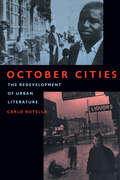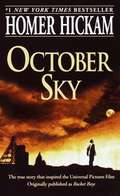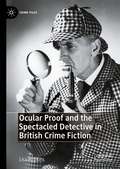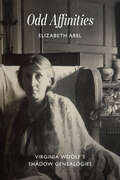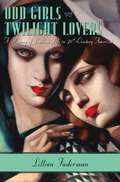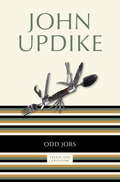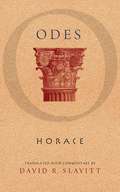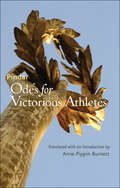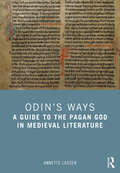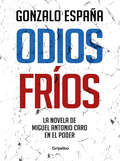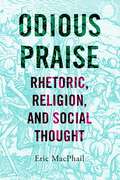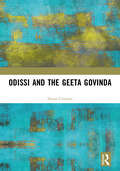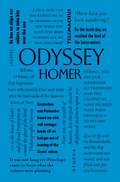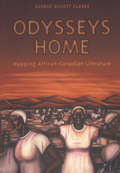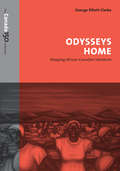- Table View
- List View
Ocean Passages: Navigating Pacific Islander and Asian American Literatures (Critical Race, Indigeneity, and Relationality #6)
by Erin SuzukiIn her pathbreaking book, Ocean Passages, Erin Suzuki explores how movement through—and travel across—the ocean mediates the construction of Asian American and Indigenous Pacific subjectivities in the wake of the colonial conflicts that shaped the modern transpacific. Ocean Passages considers how Indigenous Pacific scholars have emphasized the importance of the ocean to Indigenous activism, art, and theories of globalization and how Asian American studies might engage in a deconstructive interrogation of race in conversation with this Indigenous-centered transnationalism. The ocean passages that Suzuki addresses include the U.S. occupation and militarization of ocean space; refugee passage and the history and experiences of peoples displaced from the Pacific Islands; migratory circuits and the labors required to cross the sea; and the different ways that oceans inform postcolonial and settler colonial nationalisms. She juxtaposes work by Indigenous Pacific and Asian American artists and authors including James George, Maxine Hong Kingston, Kathy Jetñil-Kijiner, lê thi diếm thúy, Ruth Ozeki, and Craig Santos Perez. In Ocean Passages, Suzuki explores what new ideas, alliances, and flashpoints might arise when comparing and contrasting Asian and Pacific Islander passages across a shared sea.
Ocean Passages: Navigating Pacific Islander and Asian American Literatures (Critical Race, Indigeneity, and Relationality #6)
by Erin SuzukiIn her pathbreaking book, Ocean Passages, Erin Suzuki explores how movement through—and travel across—the ocean mediates the construction of Asian American and Indigenous Pacific subjectivities in the wake of the colonial conflicts that shaped the modern transpacific. Ocean Passages considers how Indigenous Pacific scholars have emphasized the importance of the ocean to Indigenous activism, art, and theories of globalization and how Asian American studies might engage in a deconstructive interrogation of race in conversation with this Indigenous-centered transnationalism. The ocean passages that Suzuki addresses include the U.S. occupation and militarization of ocean space; refugee passage and the history and experiences of peoples displaced from the Pacific Islands; migratory circuits and the labors required to cross the sea; and the different ways that oceans inform postcolonial and settler colonial nationalisms. She juxtaposes work by Indigenous Pacific and Asian American artists and authors including James George, Maxine Hong Kingston, Kathy Jetñil-Kijiner, lê thi diếm thúy, Ruth Ozeki, and Craig Santos Perez. In Ocean Passages, Suzuki explores what new ideas, alliances, and flashpoints might arise when comparing and contrasting Asian and Pacific Islander passages across a shared sea.
Oceania and the Victorian Imagination: Where All Things Are Possible
by Peter H. HoffenbergOceania, or the South Pacific, loomed large in the Victorian popular imagination. It was a world that interested the Victorians for many reasons, all of which suggested to them that everything was possible there. This collection of essays focuses on Oceania’s impact on Victorian culture, most notably travel writing, photography, international exhibitions, literature, and the world of children. Each of these had significant impact. The literature discussed affected mainly the middle and upper classes, while exhibitions and photography reached down into the working classes, as did missionary presentations. The experience of children was central to the Pacific’s effects, as youthful encounters at exhibitions, chapel, home, or school formed lifelong impressions and experience. It would be difficult to fully understand the Victorians as they understood themselves without considering their engagement with Oceania. While the contributions of India and Africa to the nineteenth-century imagination have been well-documented, examinations of the contributions of Oceania have remained on the periphery of Victorian studies. Oceania and the Victorian Imagination contributes significantly to our discussion of the non-peripheral place of Oceania in Victorian culture.
Ockhamism and Philosophy of Time: Semantic and Metaphysical Issues Concerning Future Contingents (Synthese Library #452)
by Alessio SantelliThis book discusses fundamental topics on contemporary Ockhamism. The collected essays show how contemporary Ockhamism can impact areas of research such as semantics, metaphysics and also the philosophy of science. In addition, the volume hosts one historian of Medieval philosophy who investigates the way in which William of Ockham “in flesh and bone” construed time and, more generally, future contingency.The essays explore the different meanings of this theory. They cover three main topics, in particular. The first examines the thesis that sentences and propositions about the future have a definite truth value, without any ensuing commitment to determinism or fatalism. The second topic looks at the problem whether the branching-time model needs to countenance a privileged branch (the so-called Thin Red Line). Finally, the third topic considers the idea that there are so-called soft facts. These would be the subject matter of sentences and propositions verbally about the present or the past, but metaphysically about a later time, and which might change in the future.Overall, the book provides an updated and rigorous idea of the debate about Ockhamism. It gives readers a deeper understanding into this philosophical approach influenced by William of Ockham, characterized by the rejection of the Aristotelian idea that, in order to preserve the contingency of the future, future contingents must be deemed neither true nor false.
Octavia E. Butler (Modern Masters of Science Fiction)
by Gerry CanavanI began writing about power because I had so little, Octavia E. Butler once said. Butler's life as an African American woman--an alien in American society and among science fiction writers--informed the powerful works that earned her an ardent readership and acclaim both inside and outside science fiction. Gerry Canavan offers a critical and holistic consideration of Butler's career. Drawing on Butler's personal papers, Canavan tracks the false starts, abandoned drafts, tireless rewrites, and real-life obstacles that fed Butler's frustrations and launched her triumphs. Canavan departs from other studies to approach Butler first and foremost as a science fiction writer working within, responding to, and reacting against the genre's particular canon. The result is an illuminating study of how an essential SF figure shaped themes, unconventional ideas, and an unflagging creative urge into brilliant works of fiction.
Octavia E. Butler: and Other Conversations (The Last Interview Series)
by Samuel R. Delany Melville House&“I write about people who do extraordinary things. It just turned out that it was called science fiction.&” - Octavia E. ButlerOctavia E. Butler's work broke innumerable barriers and helped open the field of science fiction to writers and readers it had never had before. As the first Black writer to win the coveted Nebula and Hugo Awards, her courage and vision left a peerless legacy for fans not just of science fiction, but of American literature. In this collection of 10 interviews, 3 of them never published, Butler speaks with candor and openness about her work, her imaginative mission, and the barriers she faced as a Black woman working in a genre dominated by white men. The book features an original introduction by science fiction legend Samuel R. Delany, in which he discusses his personal relation with Butler, providing unparalleled insight into her work and life.
Octavio Paz and T. S. Eliot: Modern Poetry and the Translation of Influence
by Tom Boll"When the sixteen-year-old Octavio Paz (1914-1998) discovered The Waste Land in Spanish translation, it 'opened the doors of modern poetry'. The influence of T S Eliot would accompany Paz throughout his career, defining many of his key poems and pronouncements. Yet Paz's attitude towards his precursor was ambivalent. Boll's study is the first to trace the history of Paz's engagement with Eliot in Latin American and Spanish periodicals of the 1930s and 40s. It reveals the fault lines that run through the work of the dominant figure in recent Mexican letters. By positioning Eliot in a Latin American context, it also offers new perspectives on one of the capital figures of Anglo-American modernism."
Octavio Paz en su siglo
by Christopher Domínguez MichaelOctavio Paz en su siglo es a la vez biografía y crítica literaria, la obra de madurez de uno de los más conocidos ensayistas hispanoamericanos de nuestro tiempo. Entre la moral de las convicciones y la moral de la responsabilidad, intelectual liberal que no renuncia a sus visiones libertarias y socialistas, Octavio Paz (1914-1998) fue una figura esencial en la transición democrática de México, siempre en controversia con nuestros «dictadores constitucionales» como con la izquierda latinoamericana, voz insustituible entre el movimiento estudiantil de 1968 y la revuelta neozapatista de 1994. Esta biografía del Premio Nobel de Literatura mexicano habla también de su turbulenta vida familiar, pero sobre todo del autor de un caudal de obras geniales, en prosa y en verso, que lo convirtieron en uno de los grandes poetas-críticos del siglo XX. «Cuando conocí a OctavioPaz yo estaba escribiendo Chateaubriand: poesía y terror. Ahora, al leer el libro de Christopher Domínguez Michael, pienso que se habría podido utilizar el subtítulo de mi libro para cifrar la vida de Paz. A fin de cuentas, ese fue el gran drama del siglo XX.» Marc Fumaroli, Letras Libres
Octavio Paz: una vuelta a su vida
by Julio Scherer GarcíaUn libro para conocer las facetas de Octavio Paz a través de las conversaciones con Julio Scherer. Aquel 18 de octubre de 1993, Julio Scherer conversó con el mayor de los intelectuales mexicanos, Octavio Paz, con quien además de entablar una sincera amistad, compartió la preocupación por analizar y esclarecer los problemas del país. Scherer, una vez más haciendo gala de sus grandes dotes periodísticas, cuestionó al ganador del premio Nobel sobre temas como el 68 y los movimientos estudiantiles de esa época, la sucesión presidencial, la evolución política de México y la democracia, entre otros. Este intercambio, además, evoca la hostilidad gubernamental e intelectual que Paz vivió tras dejar la embajada de México en la India: "Me pides un juicio sobre la vida de México y sobre la mía propia, desde 1971 hasta nuestros días... más de veinte años ricos en cambios y peripecias", comenta el poeta y escritor mexicano.
October Cities: The Redevelopment of Urban Literature
by Carlo RotellaReturning to his native Chicago after World War II, Nelson Algren found a city transformed. The flourishing industry, culture, and literature that had placed prewar Chicago at center stage in American life were entering a time of crisis. The middle class and economic opportunity were leaving the inner city, and Black Southerners arriving in Chicago found themselves increasingly estranged from the nation's economic and cultural resources. For Algren, Chicago was becoming "an October sort of city even in the spring," and as Carlo Rotella demonstrates, this metaphorical landscape of fall led Algren and others to forge a literary form that traced the American city's transformation. Narratives of decline, like the complementary narratives of black migration and inner-city life written by Claude Brown and Gwendolyn Brooks, became building blocks of the postindustrial urban literature.October Cities examines these narratives as they played out in Chicago, Philadelphia, and Manhattan. Through the work of Algren, Brown, Brooks, and other urban writers, Rotella explores the relationship of this new literature to the cities it draws upon for inspiration. The stories told are of neighborhoods and families molded by dramatic urban transformation on a grand scale with vast movements of capital and people, racial succession, and an intensely changing urban landscape.
October Sky
by Homer H. HickamThe true story, originally published as Rocket Boys, that inspired the Universal Pictures film. It was 1957, the year Sputnik raced across the Appalachian sky, and the small town of Coalwood, West Virginia, was slowly dying. Faced with an uncertain future, Homer Hickam nurtured a dream: to send rockets into outer space. The introspective son of the mine's superintendent and a mother determined to get him out of Coalwood forever, Homer fell in with a group of misfits who learned not only how to turn scraps of metal into sophisticated rockets but how to sustain their hope in a town that swallowed its men alive. As the boys began to light up the tarry skies with their flaming projectiles and dreams of glory, Coalwood, and the Hickams, would never be the same.
Ocular Proof and the Spectacled Detective in British Crime Fiction (Crime Files)
by Lisa HopkinsFrom Sherlock Holmes onwards, fictional detectives use lenses: Ocular Proof and the Spectacled Detective in British Crime Fiction argues that these visual aids are metaphors for ways of seeing, and that they help us to understand not only individual detectives’ methods but also the kinds of cultural work detective fiction may do. It is sometimes regarded as a socially conservative form, and certainly the enduring popularity of ‘Golden Age’ writers such as Christie, Sayers, Allingham and Marsh implies a strong element of nostalgia in the appeal of the genre. The emphasis on visual aids, however, suggests that solving crime is not a simple matter of uncovering truth but a complex, sophisticated and inherently subjective process, and thus challenges any sense of comforting certainties. Moreover, the value of eye-witness testimony is often troubled in detective fiction by use of the phrase ‘the ocular proof’, whose origin in Shakespeare’s Othello reminds us that Othello is manipulated by Iago into misinterpreting what he sees. The act of seeing thus comes to seem ideological and provisional, and Lisa Hopkins argues that the kind of visual aid selected by each detective is an index of his particular propensities and biases.
Odd Affinities: Virginia Woolf’s Shadow Genealogies
by Elizabeth AbelA new reading of Virginia Woolf in the context of “long modernism.” In recent decades, Virginia Woolf’s contribution to literary history has been located primarily within a female tradition. Elizabeth Abel dislodges Woolf from her iconic place within this tradition to uncover her shadowy presence in other literary genealogies. Abel elicits unexpected echoes of Woolf in four major writers from diverse cultural contexts: Nella Larsen, James Baldwin, Roland Barthes, and W. G. Sebald. By mapping the wayward paths of what Woolf called “odd affinities” that traverse the boundaries of gender, race, and nationality, Abel offers a new account of the arc of Woolf’s career and the transnational modernist genealogy constituted by her elusive and shifting presence. Odd Affinities will appeal to students and scholars working in New Modernist studies, comparative literature, gender and sexuality studies, and African American studies.
Odd Girls and Twilight Lovers: A History of Lesbian Life in Twentieth-Century America
by Lillian FadermanAs Lillian Faderman writes, there are "no constants with regard to lesbianism," except that lesbians prefer women. In this groundbreaking book, she reclaims the history of lesbian life in twentieth-century America, tracing the evolution of lesbian identity and subcultures from early networks to more recent diverse lifestyles. She draws from journals, unpublished manuscripts, songs, media accounts, novels, medical literature, pop culture artifacts, and oral histories by lesbians of all ages and backgrounds, uncovering a narrative of uncommon depth and originality.
Odes
by David R. SlavittThe "Odes" of Horace are a treasure of Western civilization, and this new English translation is a lively rendition by one of the prominent poet-translators of our own time, David R. Slavitt. Horace was one of the great poets of Rome's Augustan age, benefiting (as did fellow poet Vergil) from the friendship of the powerful statesman and cultural patron Maecenas. These "Odes," which take as their formal models Greek poems of the seventh century BCE-especially the work of Sappho and Alcaeus-are the observations of a wry, subtle mind on events and occasions of everyday life. At first reading, they are modest works but build toward a comprehensive attitude that might fairly be called a philosophy. Charming, shrewd, and intimate, the voice of the "Odes" is that of a sociable wise man talking amusingly but candidly to admiring friends. This edition is also notable for Slavitt's extensive notes and commentary about the art of translation. He presents the problems he encountered in making the translation, discussing possible solutions and the choices he made among them. The effect of the notes is to bring the reader even closer to the original Latin and to understand better how to gauge the distance between the two languages. "
Odes for Victorious Athletes (Johns Hopkins New Translations from Antiquity)
by PindarYou've just won the gold medal, what are you going to do? In Ancient Greece, your patron could throw a feast in your honor and have a poet write a hymn of praise to you. The great poet Pindar composed many such odes for victorious athletes. Esteemed classicist Anne Pippin Burnett presents a fresh and exuberant translation of Pindar's victory songs.The typical Pindaric ode reflects three separate moments: the instant of success in contest, the victory night with its disorderly revels, and the actual banquet of family and friends where the commissioned poem is being offered as entertainment. In their essential effect, these songs transform a physical triumph, as experienced by one man, into a sense of elation shared by his peers—men who have gathered to dine and to drink.Athletic odes were presented by small bands of dancing singers, influencing the audience with music and dance as well as by words. These translations respect the form of the originals, keeping the stanzas that shaped repeating melodies and danced figures and using rhythms meant to suggest performers in motion.Pindar's songs were meant to entertain and exalt groups of drinking men. These translations revive the confident excitement of their original performances.
Odin’s Ways: A Guide to the Pagan God in Medieval Literature
by Annette LassenThis book is about the Old Norse god Odin. It includes references to all occurrences of Odin in the Old Norse/Icelandic texts, including Saxo’s Gesta Danorum, the eddic poems, Snorri’s Edda, and Ynglinga saga and analyses the high medieval reception and literary representations of Odin rather than the religious character of the god. This is the only existing study of Odin in all the Old Norse/Icelandic texts and applies a contextual method: the different guises of Odin are studied on the basis of the various textual contexts and on their background in the literary and Christian intellectual milieu of the time. Contrary to existing studies, this method is non-reductive in that it does not aim at providing a synthesis about Odin’s original nature on the basis of the differing textual uses of Odin in the Middle Ages. The book argues that the perceived complexity of Odin, often highlighted in research, is first and foremost a function of the complex textual material spanning a wide variety of genres each with its particular literary conventions and of the reception of Odin in early modern and modern mythological studies.
Odin’s Ways: A Guide to the Pagan God in Medieval Literature
by Annette LassenThis book is about the Old Norse god Odin. It includes references to all occurrences of Odin in the Old Norse/Icelandic texts, including Saxo’s Gesta Danorum, the eddic poems, Snorri’s Edda, and Ynglinga saga and analyses the high medieval reception and literary representations of Odin rather than the religious character of the god. This is the only existing study of Odin in all the Old Norse/Icelandic texts and applies a contextual method: the different guises of Odin are studied on the basis of the various textual contexts and on their background in the literary and Christian intellectual milieu of the time. Contrary to existing studies, this method is non-reductive in that it does not aim at providing a synthesis about Odin’s original nature on the basis of the differing textual uses of Odin in the Middle Ages. The book argues that the perceived complexity of Odin, often highlighted in research, is first and foremost a function of the complex textual material spanning a wide variety of genres each with its particular literary conventions and of the reception of Odin in early modern and modern mythological studies.
Odios fríos: La Novela de Miguel Antonio Caro en el Poder
by Gonzalo EspañaUna novela de Gonzalo España. Narrada con la gracia y el rigor documental propios de su autor, Odiosfríos acerca al lector al Miguel Antonio Caro que no conocemos. Sunombre se asocia con el mármol: fue uno de los redactores principales dela Constitución de 1886, un latinista consumado "traductor célebre deHoracio y Virgilio" y un gramático puntilloso. Pero Caro, católicofuribundo, ultraconservador, maquinador y rencoroso, tuvo un papelfundamental en los acontecimientos más importantes de finales del sigloXIX y comienzos del XX: como lo revelan a la perfección estas páginas,la Guerra de los Mil Días, la separación de Panamá, así como laagudización del conflicto interno y los resentimientos entre losprincipales partidos de Colombia, fueron fruto, en gran medida, de suintransigencia. Esta extraordinaria novela, tan ágil y apasionante comola historia que recrea, es mucho más que el retrato completo de unhombre, en sus facetas pública e íntima: es el retrato de un país y unaépoca, y una pieza invaluable en la reconstrucción de nuestro pasado
Odious Praise: Rhetoric, Religion, and Social Thought
by Eric MacPhailThis book reveals a tradition of thought overlooked in our intellectual history but enormously influential even now: the tradition of odious praise. Distinct from more conventional rhetorical exercises, such as panegyric or the funeral oration, odious praise uses acclaim to censure or to critique. This book reassesses the genre of praise-and-blame rhetoric by considering the potential of odious praise to undermine consensus and to challenge a society’s normative values.Surveying literature from ancient Greece to Renaissance Europe, Eric MacPhail identifies a tradition of epideictic rhetoric that began with the sophists but was cultivated and employed most vigorously by Renaissance political thinkers. Presenting examples from the writings of Lorenzo Valla, Niccolò Machiavelli, Desiderius Erasmus, Michel de Montaigne, Joachim du Bellay, and Jean Bodin, among others, MacPhail shows that by inscribing a positive value to an object worthy of blame, cultural values are turned on their head. MacPhail traces the use of this technique to critique the values of the classical and scholastic traditions. Recognizing and engaging with this tradition, MacPhail argues, can reinvigorate our study of the history of social thought and reveal further the roots of modern social science.Rigorous and lucid, Odious Praise presents a rhetoric capable of suspending and thus critiquing the values of a culture, and in doing so, it uncovers the first serious attempts at social thought and the seedbed of modern social science. It will be welcomed by scholars of Renaissance literature and culture, the history of rhetoric, and political thought.
Odissi and the Geeta Govinda
by Ileana CitaristiThe book attempts to trace an overview of the different components that define the cultural landscape of the state of Odisha in relation to its history, religious cults, art, and literature and to link the development of the various aspects to the role played over the centuries by the Geeta Govinda poem in its different manifestations. From being an important component of the rituals performed in the Jagannath Temple to becoming an essential part of the people’s daily lives and artistic expressions, this immortal poem has exercised its influence on the cultural landscape of the state from its early inception in the twelfth century until present times. Religious beliefs, visual representations, performative expressions, and literary compositions have been influenced by the strong emotional appeal contained in its verses. Its musical structure, spiritual underline and histrionic content have been an essential font of inspiration in the process of the rediscovery of a cultural identity during the last century and continue to exercise a strong influence on the performing arts of the present times. Among all the art forms, the classical style of Odissi dance, the way it has been re-structured in the middle of the last century, is perhaps the one which bears the closest contact with the poem, almost being synonymous with it. The dance’s lyrical quality and its emotional appeal steeped in a long history of association with devotional and spiritual values make it an ideal form of visual expression for the literary content of the poem.
Odyssey: Rendered Into English Prose For The Use Of Those Who Cannot Read The Original (Wordsworth Classics)
by Samuel ButlerThe story of Odysseus' perilous journey home after the fall of Troy relates allegorical tales of goddesses and sirens, capture and escape, and maneuvering between Scylla and Charybdis. After ten years of travel, Odysseus finally reaches Ithaca to find his family in turmoil. The saga of his efforts to make things right is one of the oldest works of Western literature, and still offers powerful lessons for modern times.
Odysseys Home: Mapping African-Canadian Literature
by George Elliott ClarkeOdysseys Home: Mapping African-Canadian Literature is a pioneering study of African-Canadian literary creativity, laying the groundwork for future scholarly work in the field. Based on extensive excavations of archives and texts, this challenging passage through twelve essays presents a history of the literature and examines its debt to, and synthesis with, oral cultures. George Elliott Clarke identifies African-Canadian literature's distinguishing characteristics, argues for its relevance to both African Diasporic Black and Canadian Studies, and critiques several of its key creators and texts. Scholarly and sophisticated, the survey cites and interprets the works of several major African-Canadian writers, including André Alexis, Dionne Brand, Austin Clarke, Claire Harris, and M. Nourbese Philip. In so doing, Clarke demonstrates that African-Canadian writers and critics explore the tensions that exist between notions of universalism and black nationalism, liberalism and conservatism. These tensions are revealed in the literature in what Clarke argues to be - paradoxically - uniquely Canadian and proudly apart from a mainstream national identity. Clarke has unearthed vital but previously unconsidered authors, and charted the relationship between African-Canadian literature and that of Africa, African America, and the Caribbean. In addition to the essays, Clarke has assembled a seminal and expansive bibliography of texts - literature and criticism - from both English and French Canada. This important resource will inevitably challenge and change future academic consideration of African-Canadian literature and its place in the international literary map of the African Diaspora.
Odysseys Home: Mapping African-Canadian Literature
by George Elliott ClarkeOdysseys Home: Mapping African-Canadian Literature is a pioneering study of African-Canadian literary creativity, laying the groundwork for future scholarly work in the field. Based on extensive excavations of archives and texts, this challenging passage through twelve essays presents a history of the literature and examines its debt to, and synthesis with, oral cultures. George Elliott Clarke identifies African-Canadian literature's distinguishing characteristics, argues for its relevance to both African Diasporic Black and Canadian Studies, and critiques several of its key creators and texts. Scholarly and sophisticated, the survey cites and interprets the works of several major African-Canadian writers, including André Alexis, Dionne Brand, Austin Clarke, Claire Harris, and M. Nourbese Philip. In so doing, Clarke demonstrates that African-Canadian writers and critics explore the tensions that exist between notions of universalism and black nationalism, liberalism and conservatism. These tensions are revealed in the literature in what Clarke argues to be – paradoxically – uniquely Canadian and proudly apart from a mainstream national identity. Clarke has unearthed vital but previously unconsidered authors, and charted the relationship between African-Canadian literature and that of Africa, African America, and the Caribbean. In addition to the essays, Clarke has assembled a seminal and expansive bibliography of texts – literature and criticism – from both English and French Canada. This important resource will inevitably challenge and change future academic consideration of African-Canadian literature and its place in the international literary map of the African Diaspora.
